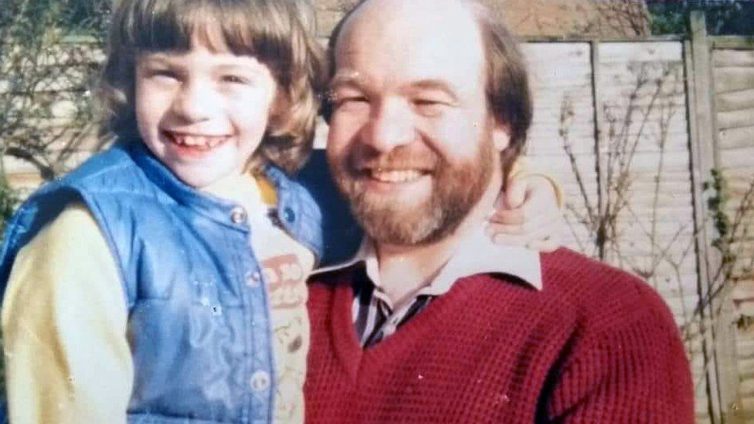When Francesca Bussey's deaf father was admitted to hospital in 2019, she dropped everything to be available to sign for him. But is it always appropriate for relatives to interpret for their loved ones? And are we taking advantage of goodwill to cover for a shortfall in professional interpreting services?
Francesca Bussey was at her elderly father's bedside when a doctor arrived with terrible news.
Her profoundly deaf dad had been in hospital for a month, and although Francesca had repeatedly asked nurses to book an interpreter for him, he had received just two hours of British Sign Language (BSL) interpreting support.
"When he was well my dad could lip read," Francesca says, "but by this point he could barely see. They put up a sign behind his bed - a picture of an ear with a cross through it - and they'd come round and shout at him, and he'd be frightened and confused and not know what was going on."
So 42-year-old Francesca - like tens of thousands of others across the UK who routinely lend their ears and signing skills to their deaf parents to help them navigate a world built for the hearing - stepped in. And without missing a beat, Francesca interpreted the news for her father that day.
"There was no time lag," she says, "I was told it. I interpreted it.
"I had to tell him he was dying."
Francesca grew up as a hearing child with two deaf parents in the 1980s - a time before mobiles and texting - and started signing at just seven months old.
"My first language is British Sign Language (BSL)," she says. "It's a huge part of me - I love my language."
Francesca took on a lot of responsibility from a very young age - her parents had little choice but to rely on her to get things done that the rest of us take for granted. By the age of four she was making phone calls on their behalf, and by eight was dealing with the bank.

"They were always very aware of not wanting to burden me," she says, "but it was just easier for me to do it. I felt very grown-up, I was different and important."
Looking back though, Francesca says it was hard having to constantly help her parents. "I was on call all the time," she says. "I never had a time when I didn't feel responsible for communication.
"As a child you aren't able to say, 'I can't do it anymore,' [because] you don't know where your boundaries are."
Being the child of deaf parents is no ordinary upbringing. Thirty-one-year-old Glaswegian comedian Ray Bradshaw has carved out a stand-up career mining a rich seam of stories from his childhood.
"If I swore as a kid while signing, my parents would take me into the kitchen and wash my hands with soap," he jokes.
This is a signed version of the radio programme, CODA: I'm the thumb in the family
Ray's material is witty, light-touch activism, often hinging on the scarce availability of BSL interpreters in schools, hospitals, and businesses. When the interpreter is a no-show, family members often jump in to fill the gap - like the time Ray mischievously stepped up to "mistranslate" his school parents' evening to his own advantage.
But Ray says something is wrong when people have had to translate terminal illness diagnoses to their own parents.
Prof Jemina Napier, a specialist in sign language and communication at Heriot-Watt University, says hearing children of the deaf are talented linguists. But they are also equipped with a whole slew of cognitive and emotional skills that come from being keyed into the adult world from an early age, deciphering the subtle registers of adult speech, and solving complex problems.
Like Francesca and Ray, Prof Napier is hearing but grew up in a deaf household. She rails against the notion of deafness as a deficit, seeing it instead as a cultural identity to celebrate, and is similarly positive about interpreting. She calls it "brokering", to encompass a sense of the emotional negotiation involved.
But there's a vast difference between dealing with a pizza delivery at the front door and interpreting in challenging situations as Francesca had to in hospital with her father, she says.
"Kids feel out of their depth. The emotional impact of those very high stakes settings is not appropriate."
Thirty-year-old Pearl Clinton also had to interpret a terminal illness diagnosis. She was 12 when it fell to her to explain to her grandmother that she was dying.
Now Pearl is campaigning to put an end to family members interpreting at medical appointments, not only because of the difficulties they face relaying complex medical information, but also because of the potential impact that having to break bad news might have on mental health.
"Since launching the petition, I've heard so many stories," Pearl says. "It is still happening."
Under the 2010 Equality Act, deaf people should have access to sign language interpreting in hospital, but in reality interpreters are thin on the ground. Hospital staff are under pressure and don't always recognise that it's an issue to rely on relatives.
"It's absolutely not their fault," Francesca says. "They're ridiculously busy, they're overwhelmed, and sometimes they don't know how to do it."
The world has moved on since Francesca's profoundly deaf mum was a child. She was sent to boarding school in 1952 when she was four years old. Francesca says the aim was to produce deaf people who could, "function in mainstream society" - but she simmers with anger as she describes the dreadful treatment her mother experienced there.
"My mum was put in a straitjacket basically - they tied her arms to the bed and put her hands in gloves. Another time she was locked in an air-raid shelter," Francesca says.
"Imagine being a small child, punished for trying to talk to your friends and use sign language, when you can't hear anything and your family isn't there."
Francesca says her mother is a smart woman, but she left school at 16 with no qualifications and a reading age of about nine. She says the treatment her mother endured at boarding school affected her mental health well into adulthood.
"There is a whole generation of deaf people for whom similar things happened," Francesca says.

There are still many frustrations for deaf people today. When activist and deaf parent Rubbena Aurangzeb-Tariq was employed as an accessibility consultant for a train company, she advised them that their ticket office window glass was too reflective for lip-readers. It was easily remedied with a change of lighting or non-reflective glass, but nothing was done.
For Rubbena, this isn't just annoying, but also belittling as her 12-year-old daughter has to come along to buy her train tickets.
But there have been many positive changes. Growing deaf awareness is making a difference. Deaf parents have access to better education, and information technology means that they are much less reliant on their hearing children.
There are organisations for the children of deaf adults (CODAs), where people can share their experiences and celebrate their heritage, and a historic lack of representation in the mainstream media is also being challenged.
In 2020, 27-year-old Rose Ayling-Ellis became the first deaf actor or actress to play a deaf character on EastEnders, and when she became the first deaf contestant on Strictly Come Dancing this year, there were reports of record numbers of people searching for signing courses online.
Ella Depledge, aged 21, is one of the younger generation of hearing children who feel less pressure about interpreting for their deaf parents than others perhaps have in the past.
"It's stressful," Ella says, "I used to feel very heavily responsible and it wasn't good for me. I made a decision a while ago to just say 'no'."
Ella's parents support her decision, but she appreciates the linguistic insights her early interpreting has given her and has just finished a degree in English at King's College, London.
"If you can sign, it gives you a really cool understanding of language," she says.
Francesca's lifelong responsibility for interpreting on behalf of her parents has shaped her, too. She has a successful career subtitling for a TV network and laughs as she describes herself as very good at "adulting" and never being late for anything.
But being a daughter and an interpreter all at once - and finding out that her father was dying one moment and having to relay that information the next - was difficult.
"I've done a lot of hard things in my life," she says, "but that was the hardest."
Images courtesy of Francesca Bussey.
Latest Stories
-
SHS heads demand payment of outstanding funds before reopening of schools
10 minutes -
We thank God for the 2024 general elections – Akufo-Addo
24 minutes -
Coconut Grove Beach Resort marks 30 years of excellence with memorable 9 lessons & carols service
36 minutes -
WAFU B U-17 Girls’ Cup: Black Maidens beat Nigeria on penalties to win inaugral tournament
1 hour -
Real Madrid beat Sevilla to keep pressure on leaders Atletico
2 hours -
Liverpool put six past Spurs to go four points clear
2 hours -
Manchester United lose 3-0 at home to Bournemouth yet again
2 hours -
CHAN 2024Q: ‘It’s still an open game’ – Didi on Ghana’s draw with Nigeria
3 hours -
CHAN 2024Q: Ghana’s Black Galaxies held by Nigeria in first-leg tie
4 hours -
Dr Nduom hopeful defunct GN bank will be restored under Mahama administration
4 hours -
Bridget Bonnie celebrates NDC Victory, champions hope for women and youth
4 hours -
Shamima Muslim urges youth to lead Ghana’s renewal at 18Plus4NDC anniversary
5 hours -
Akufo-Addo condemns post-election violence, blames NDC
5 hours -
DAMC, Free Food Company, to distribute 10,000 packs of food to street kids
7 hours -
Kwame Boafo Akuffo: Court ruling on re-collation flawed
7 hours

